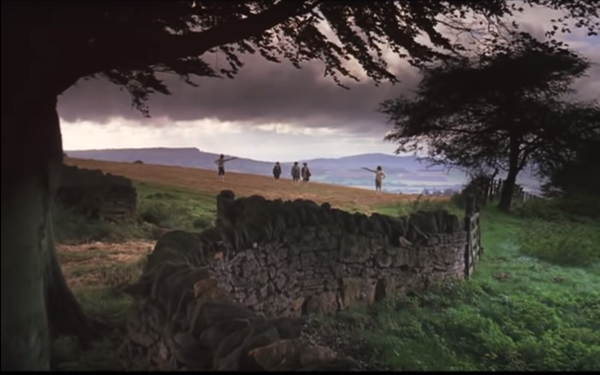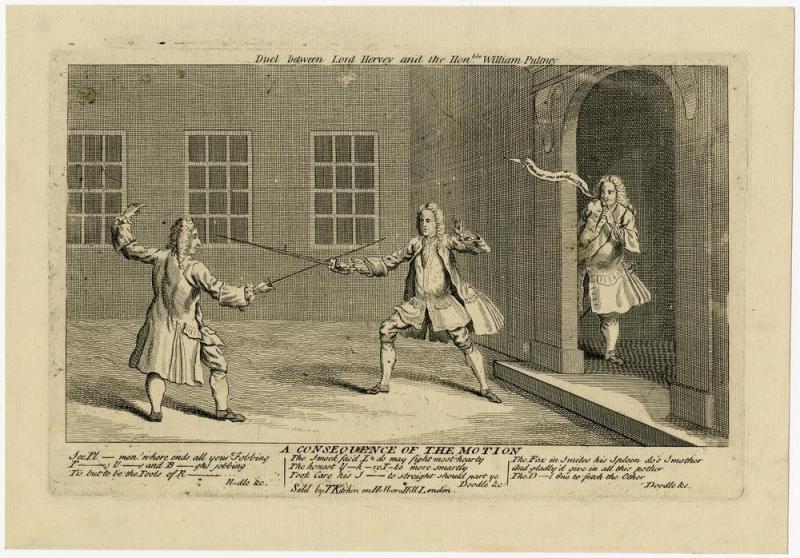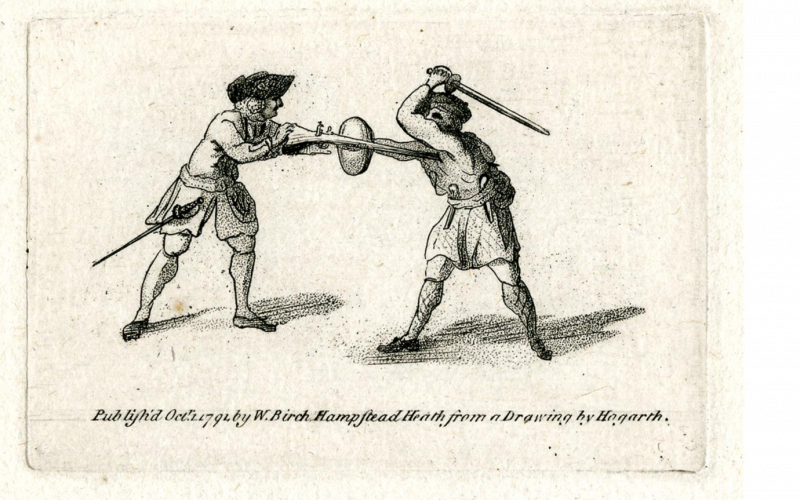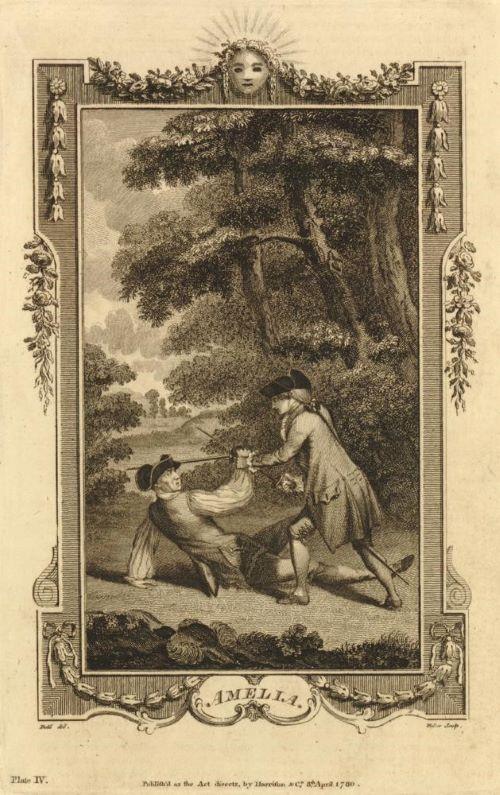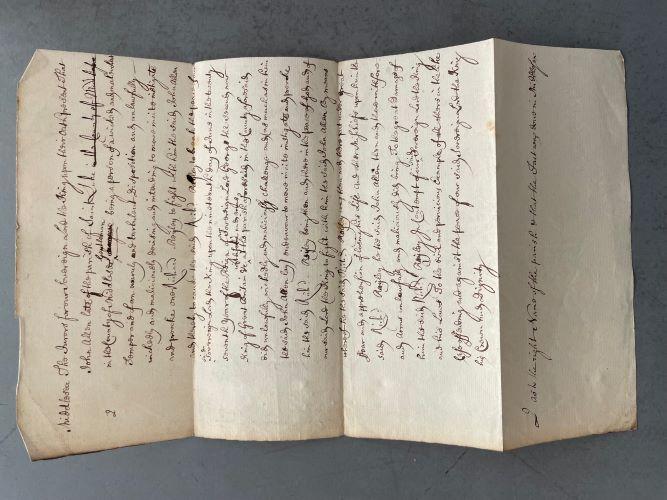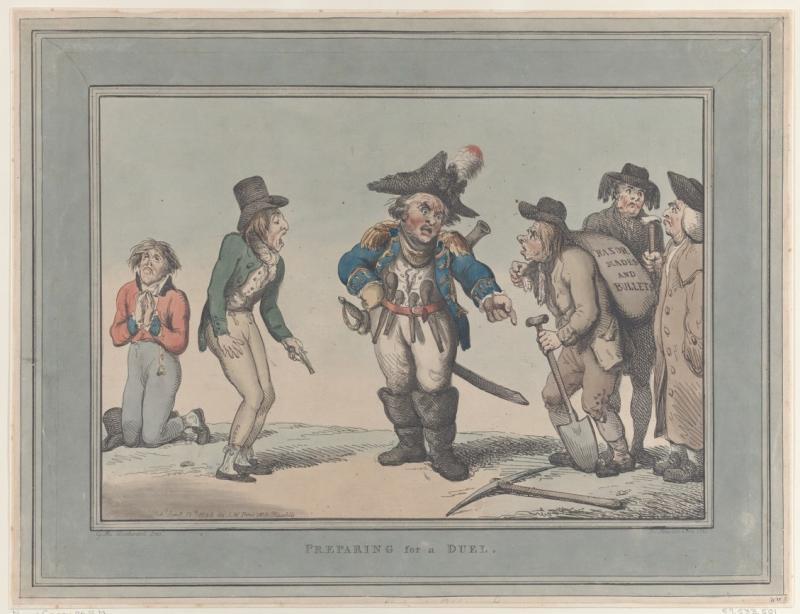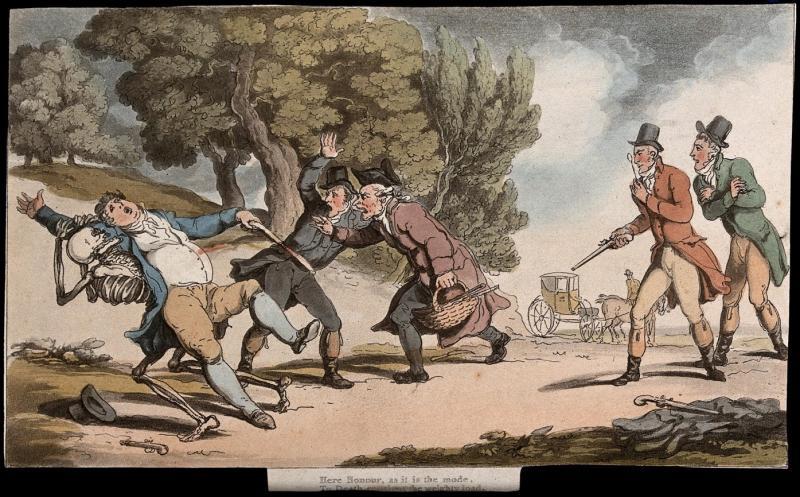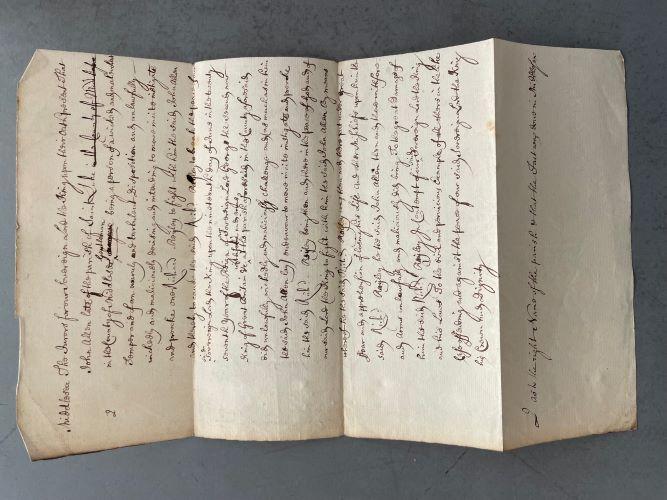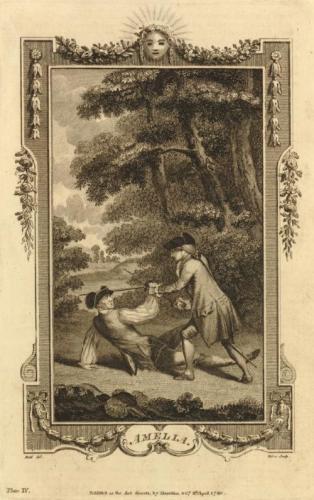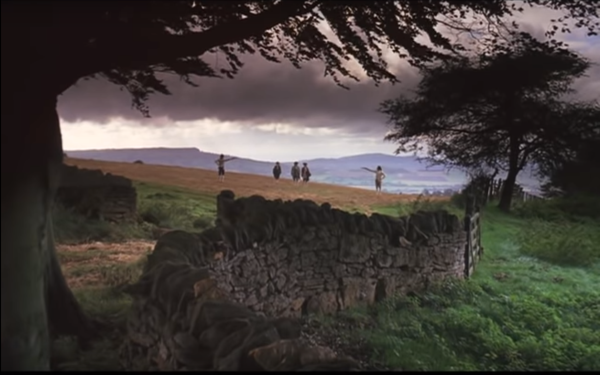Abstract
Duelling was not simply an English affair, but also a social practice indulged in and debated throughout Europe. Originally, the duel was perhaps not as regulated as we have come to think of it, and it proceeded from the disorder and the general violence of society. In spite of the image of the eighteenth century as an age of politeness, duels persisted in the eighteenth century, and their endurance cannot be understood without a reflection on their long history, which is also briefly sketched here.
Duelling was not simply an English affair, but also a social practice indulged in and debated throughout Europe. Originally, the duel was perhaps not as regulated as we have come to think of it, and it proceeded from the disorder and the general violence of society. Keith Thomas has described the masculine, violent culture which presided over seventeenth-century England: ‘Physical combat, of a more or less ritualized kind, was a part of masculine culture at every social level. Just as the upper classes had their ‘roisters’, ‘hectors’, and duellists, so the lower classes had their street bullies, ‘ruffians’, and ‘roaring boys’.1 In spite of the image of the eighteenth century as an age of politeness, duels persisted in the eighteenth century, and their endurance cannot be understood without a reflection on their long history, which is also briefly sketched here.
- 1. Keith Thomas, The Ends of Life: Roads to Fulfilment in Early Modern England (Oxford : Oxford University Press, 2009), p.51.
What were duels?
Duels find their origin in the ancient ethos of chivalry, when honour was the supreme value to be defended in a duel.2 It is a masculine endeavour. A duel pits together two opponents, the offended one being suspected, not of having provoked his opponent, but of having lied.3 In different countries, there are different ways of organising the duel, but by and large, Donna Andrew’s description represents the situation with accuracy:
[…] following an affront, the parties were expected to approach seconds to represent them, who would attempt peacefully to resolve the conflict, but, if this proved impossible, would assist their principals at the event, would try ‘to see that all was upon the square, make a faithful report of the whole combat’. They would secure weapons, transportation, and medical assistance; they would discuss duelling procedures and would attend the duel to make sure that only honourable conduct would occur.4
In effect, this was not always the case. Up until the end of the eighteenth century, people mainly fought with swords (the attribute of noblemen and gentility, not to mention of course military men), increasingly with pistols. Quite importantly, people would only fight duels with their social equals.5
In the Renaissance, in Italy or in France, courts of honour were set up to adjudicate in disputes. In sixteenth-century France, duels had been left to proliferate in spite of an edict of 1566 which threatened duellists with the death penalty. In the seventeenth century, Richelieu tried to put a stop to duelling but found it difficult to enforce a legislation banning the practice completely. Perhaps it was the example of France which made duelling popular in England, but the practice was certainly rife in England at the beginning of the seventeenth century. Hume tells us in his History of England, that ‘the fury of duels’ prevailed in the reign of James I.6 While this may have been an impression more than a reality, the early years of the seventeenth century in England certainly saw a number of debates and efforts to legislate and prevent duels from taking place. Sir Edward Coke insisted that to kill a man in a duel was a murder. In 1615, the court of Star Chamber condemned the idea ‘that the private duel in any person whatsoever had any ground of honour’ (Ibid.).
- 2. ‘While honour and dignity are the reward of virtue, any lapse of it that may tend to affect the character of gentleman, is punishable by formal expulsion from peculiar association, and ultimately, with loss of privileges, from society in general.’ The British Code of Duel: A Reference to the Laws of Honour and the Character of a Gentleman (London: Knight and Lacey, 1824), p. 9.
- 3. See also The Spectator, n° 99 (23 June 1711).
- 4. Donna T. Andrew, Aristocratic Vice. The Attack on Duelling, Suicide, Adultery, and Gambling in Eighteenth-Century England (New Haven and London: Yale University Press, 2013), p. 46.
- 5. On the forms of duels and their political consequences, see Alexis Tadié, ‘Comment termine-t-on les querelles? A propos du duel’, Revue de synthèse (tome 137, 6e série, n° 3-4, 2016) pp. 379-82.
- 6. Quoted by V.G. Kiernan, The Duel in European History. Honour and the Reign of the Aristocracy (Oxford: Oxford University Press, 1986), p. 80.
Against Duelling
Francis Bacon was of course involved in the debate, and his The Charge of Sir Francis Bacon…Touching Duells was one of the two important texts of 1610, the other one being Thomas Middleton’s The Peace-Maker. These texts attacked both duels and the masculinity which they were supposed to embody, and framed the debate for the years to come. They placed duels in the wider context of a country which needed peace rather than war, and commended King James for having worked for peace in the international arena. For Middleton, for instance, there is a continuity between war and duels, and duels are a sign of the corruption of society. He also underlines the religious dimension to the argument, suggesting that duels are opposed to the commandments of God. Finally, for Middleton, duelling has a political dimension. If individuals take their own reputation in their hands, they then undermine the King, who is responsible for the welfare of all. Like Middleton, Bacon thinks that duels are not a sign of courage and honour but, on the contrary, of shame and dishonour. For Bacon, true honour lies in the rewards of virtue, and no insult can alter this. To oppose duels is to question the ideals of civility and sociability which were imported from abroad, and which are opposed to the ideals promoted by the Kingdom. By opposing the duel-based conception of honour, Bacon and Middleton rejected a certain conception of the place of the individual in society. So that arguments about duels, as is clear from these two early texts, involve issues to do with honour, but also with war, religion, and politics.
The Persistence of Duelling
Whether these debates, together with a measure of law enforcement, had an effect on duels is hard to ascertain, but, according to Kiernan, ‘the number of recorded duels declined, however, after the second decade of the century’ (83). Both in France and in England, they were then revived. In England, the courtly practice of duelling was not accepted by the Puritans, and Cromwell issued a proclamation against it in 1654. Under the Restoration, the return of the aristocracy made duelling more frequent. Duels endured in England in the eighteenth century and the law which condemned duelling was seldom enforced: ‘Under George III (1760-1820) 172 duels were reported; no very large total it may be for a reign of sixty years, but ninety-one of them had fatal results’ (Kiernan 102). The archives reveal in any case that the practice of duelling could be encountered throughout the kingdom, from Cornwall to Yorkshire, from Durham to Devonshire. In London, there were of course specific places for duelling encounters, such as Covent Garden, Lincoln’s Inn Fields, the Ring in Hyde Park, Forty Footsteps Field, Barnes Elms, or Wimbledon Common in Surrey. The same was true of Scotland and of the Anglo-Irish, while even in India the practice was rife among the colonials. In the second half of the century, reports in the press increased and seemed largely to involve military men (Andrew 49). There are of course a number of reasons why the practice should have persisted, ranging from middle-class aspirations to gentility, to a veneration of the gentleman’s code, to an ideal of military fame. And it was not infrequent to find that military men were involved in duels. There were also instances when the cause for the duel appears, in the records, to be less distinguished, although a conception of honour might still be involved, as when in Middlesex, on the 2 November of the 21st year of the reign of King George III, in the case of John Sbirel vs John Legge, Sbirel ‘took hold of the nose of the said John Legge and then and there pulled and squeezed the said John Legge by his nose.’
There were also more mundane reasons why duelling carried on, and the connections established by the opponents to gambling between drinking, gambling and duels were frequent. Duels also occurred in political contexts, where factions would easily find a pretext for a duel (Andrew 52-8). In England, it seems that the number of duels had waned by the end of the eighteenth century (Kiernan 185).
In an issue of The Spectator devoted to clubs, Addison tells us that there was even a club which he finds ‘mischievous’, the ‘Club of Duellists’, where none could be admitted if they had not killed a man in a duel. The members sat in the order of the number of men they had killed.7 More generally, Addison finds duelling a thing of the past, suggesting for instance: ‘To speak disrespectfully of any Woman, is Expulsion from our gentle Society. As we are at present all of us Gown-men, instead of duelling when we are Rivals, we drink together the Health of our Mistress.’8 In another essay, he attacks the false honour involved in duels: ‘The placing the Point of Honour in this false kind of Courage, has given Occasion to the very Refuse of Mankind, who have neither Virtue nor common Sense, to set up for Men of Honour.9 Elsewhere, The Spectator argues that : ‘[…] by the Force of a Tyrant Custom, which is misnamed a Point of Honour, the Duellist kills his Friend whom he loves; and the Judge condemns the Duellist, while he approves his Behaviour.'10 And The Spectator advocates finding other ways to resolve the quarrels: ‘ […] instances of Ignominy were necessary in the Cure of this Evil, but considering that it prevailed only among such as had a Nicety in their Sense of Honour, and that it often happened that a Duel was fought (to save Appearances to the World) when both Parties were in their Hearts in Amity and Reconciliation to each other; it was evident, that Turning the Mode another way would effectually put a Stop to what had being only as a mode.’11
- 7. Addison, The Spectator, no. 9 (10 Mar. 1710-11), vol. I. p. 41. Also mentioned by Kiernan, p. 99.
- 8. The Spectator, n° 30 (4 April 1711), vol. I, p. 126.
- 9. The Spectator, n°99, June 23, 1711, vol. I, p. 418-9.
- 10. Ibid., n° 84 (June 6, 1711), vol. I, p. 357-60.
- 11. The Spectator, n° 97 (June 21, 1711), vol. I, p. 410-2.
Time and again, throughout the eighteenth century, Addison’s (and Steele’s) arguments will be heard against the barbaric practice of duelling. But they seem, at the same time, to have been largely ineffectual at preventing duels. It is only at the end of the century that the numbers of challengers being taken to court increased significantly, perhaps because the public finally believed that duelling was not the most desirable way of settling a dispute (Andrew 71).12
- 12. See also : ‘[…] by the end of the Napoleonic wars, again thanks to the publicity afforded by press coverage, more and more of even such men were using the Law, the magistracy, and the courts, as alternative venues to the fighting field. Duelling had not ended, but its imperative, its power, had waned and could be, though it not always was, resisted’ (Andrew, p. 81).
Duels in Literature
The literature of the eighteenth century echoes concerns for duels, and while the practice was still widespread, novels often cast a disparaging eye on the version of honour which duelling was supposed to uphold. Scenes of duels in eighteenth-century plays and novels both echo the arguments against the practice but also stage duels, perhaps reflecting the tensions and contradictions which existed in society itself around the practice of duelling. See for instance John Leigh, Touché: The Duel in Literature (Harvard University Press, 2015) who argues that duels are caught in a contradiction between the neoclassical dimension of duelling and the condemnation by critics of the medieval barbarity of duelling.In Richardson’s Clarissa or in Rousseau’s La Nouvelle Héloïse, for instance, the heroine insists, on the eve of the duels which conclude the novels, on the barbarity of the practice, echoing some of the arguments made over the centuries against such acts of violence. In Sheridan’s The Rivals, duelling is at the centre of the action, but appears as a ridiculous enterprise—and in fact, the duel never takes place. It is provoked by Sir Lucius O’Trigger who encourages Bob Acres to provoke his rival: ‘What the devil signifies right, when your honour is concerned? Do you think Achilles, or my little Alexander the Great ever inquired where the right lay?'Richard Sheridan, The Rivals, ed. Tiffany Stern (London: Bloomsbury, 2004 [1775]), act III, sc. IV, p. 116. And later on, Sir Lucius sums up the argument by stating: ‘The quarrel is a very pretty quarrel as it stands; we should only spoil it by trying to explain it.' (act IV, sc. III, 138)
In long eighteenth-century literature more generally, duels are ubiquitous. Kiernan quotes Restoration comedies such as The Comical Revenge where Sir Nicholas Cully, who owes his knighthood to Cromwell and is in other words a bogus gentleman, ends up not fighting the duel into which he was provoked, and pays the debt which he owed. In Fielding’s Joseph Andrews, Beau Diapper makes advances to Fanny, and Joseph offers to meet him with any weapon. In Tom Jones, the hero fights a duel with Fitzpatrick. In Amelia, Dr Harrison finds that the defence of honour is incompatible with the teachings of religion (Andrew 44). In Smollett’s Roderick Random, the hero is always ready to fight a duel, paying tribute to his Scottish origins, to his noble ancestry, and to the belief that the sword may help him get into the world—in spite of the fact that Smollett attacks duels in his Travels, and in particular ‘the folly and the mischief which are countenanced by the modern practice of duelling’ (quoted by Kiernan 174).
Although Thackeray’s Barry Lyndon was written in the nineteenth century, the action is set in the eighteenth century, and the hero, who fights a duel at the beginning of the novel, is forced to flee, thinking (wrongly) that he has killed his opponent. Stanley Kubrick’s adaptation opens on a duel in which the hero’s father is killed and ends on a duel between Barry and his stepson.
The end of Clarissa is perhaps the most perfect example of the contradiction of duels, when Morden defeats Lovelace in the final scene, in spite of the heroine’s entreaties:
When the Colonel took leave of him, M. Lovelace said in French, You have well revenged the dear creature.
I have, sir, said Mr Morden, in the same language: and perhaps shall be sorry that you called upon me to this work, while I was balancing whether to obey, or disobey, the dear angel.
There is a fate in it! replied my chevalier — a cursed fate! — or this could not have been! — But be ye all witnesses, that I have provoked my destiny, and acknowledge that I fall by a man of honour.15
Thus the duel performs at the same time the revenge over the villain, the expiation of Lovelace’s sins, and the renewed power of honour. The end of the novel, somewhat paradoxically, dismisses the heroine’s reservations about duels and offers the reader a form of poetic justice.16
The literary treatment of duelling articulates in conflicting, sometimes contradictory ways, the nostalgia for what was beginning to be, in the eighteenth century, an outdated form of heroism and honour, a fascination for courage or cowardice (in comedies in particular). In this sense, it does not take sides in the debate but lets readers return to these forms to reflect upon their enduring presence throughout the century.
Share
Further Reading
Bacon, Francis, The Charge of Sir Francis Bacon, Knight, His Majesties Attourney General, Touching Duells, Upon an Information in the Star-Chamber against Priest and Wright, (London, 1614).
Billacois, François, Le Duel dans la société française des XVIe et XVIIe siècles : essai de psychosociologie historique (Paris : Éditions de l’École des Hautes Etudes en Sciences Sociales, 1986).
Fielding, Henry, Joseph Andrews, ed. Thomas Keymer (Oxford: Oxford University Press, 2008 [1742]).
Middleton, Thomas, The Peace-Maker: or, Great Britaines blessing. Fram’d for the continuance of that mightie happinesse wherein this kingdome excells many empires. Shewing the idlenesse of a quarrelling reputation wherein consists neyther manhood nor wisdome. Necessarie for all magistrates, officers of peace, masters of families, the confirmation of youth, and for all his Maiesties most true and faithfull subiects: to the generall auoyding of all contention and bloud-shedding (London, 1618).
Peltonen, Markku, The Duel in Early Modern England: Civility, Politeness, and Honour (Cambridge: Cambridge University Press, 2003).
The Spectator, ed. Donald F. Bond, 5 vols (Oxford: Oxford University Press, 1965).
